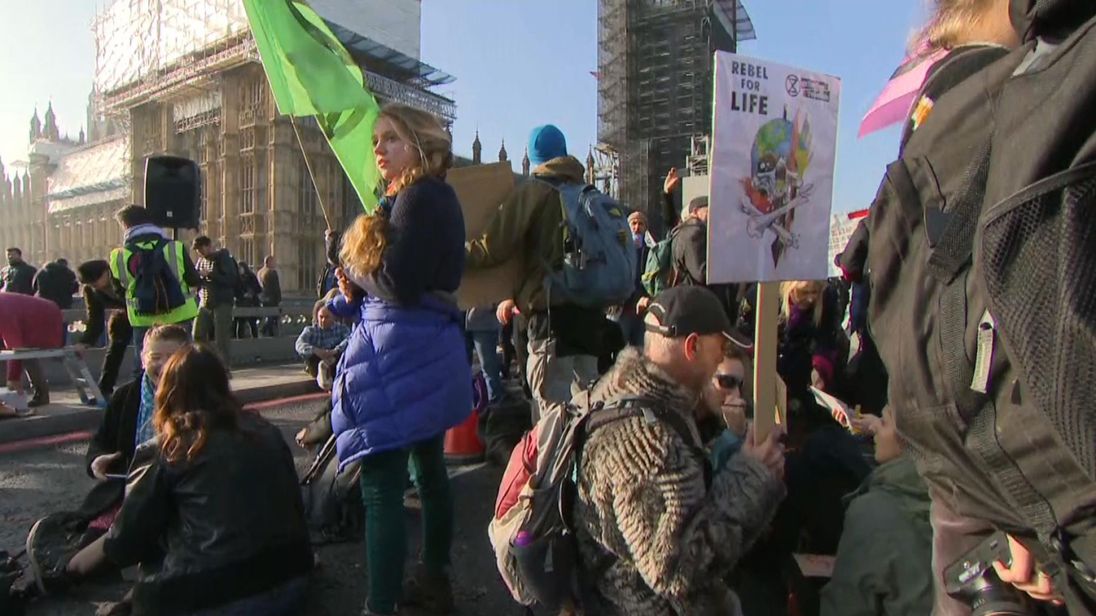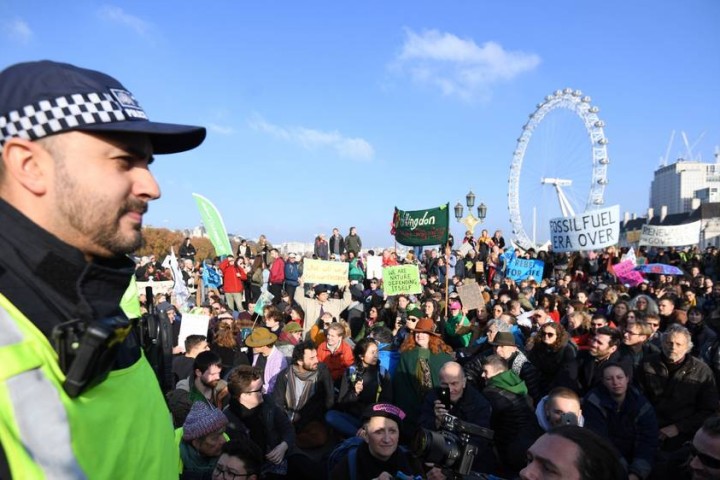Eighty-five people have been arrested as thousands of demonstrators occupied five bridges in central London to voice their concern over the looming climate crisis.
Protesters, including families and pensioners, began massing on five of London’s main bridges from 10am on Saturday. An hour later, all the crossings had been blocked in one of the biggest acts of peaceful civil disobedience in the UK in decades. Some people locked themselves together, while others linked arms and sang songs.
By 2pm the blockade of Southwark Bridge had been abandoned and protesters moved from there to Blackfriars Bridge, where organisers said they were soon to move west towards Westminster Bridge.
Demonstrators occupied Southwark, Blackfriars, Waterloo, Westminster and Lambeth bridges.
The Metropolitan police said all the bridges had since reopened
and that most of the arrests had been for obstruction under the Highways Act.
Afterwards, demonstrators gathered in Parliament Square to hear speeches. Roger Hallam, one of the strategists behind the actions, told the Guardian he felt the protest had been fantastic.
“This is total prediction stuff, mass participation civil disobedience,” he said. “They can’t do anything about it unless they start shooting people, and presumably they won’t do that.”
The day was due to end with an interfaith ceremony outside Westminster Abbey.
The move is part of a campaign of mass civil disobedience organised by a new group, Extinction Rebellion, which wants to force governments to treat the threats of climate breakdown and extinction as a crisis.
“The ‘social contract’ has been broken … [and] it is therefore not only our right but our moral duty to bypass the government’s inaction and flagrant dereliction of duty and to rebel to defend life itself,” said Gail Bradbrook, one of the organisers.
Alice, 19, from Bristol was one of those blocking Westminster Bridge.
“I took the coach at 3am to make sure I didn’t miss it,” she said, “and I’m so glad that I did. It’s a tiny personal inconvenience and, having made it, I get to be part of a rebellion.
“This moment will be remembered in the history books, when we finally stopped allowing our leaders to take us over the cliff.”
Jenny Jones, the Green party peer, joined the protest on Westminster Bridge. She backed the nonviolent direct action taken by demonstrators.
“We are at the point where if we don’t start acting and acting fast we are just going to wipe out our life support system,” she said.
“It’s fine to think we are a rich country, the sixth biggest economy in the world, but actually we won’t do any better than anywhere else because climate change will massively affect us too.
“Basically, conventional politics has failed us – it’s even failed me and I’m part of the system – so people have no other choice.”
Father Martin Newell said on Blackfriars Bridge: “What brought me here is the climate emergency, the extinction emergency and my faith in God who created all this and whose creation we’re destroying and crucifying … I’m called as a Christian to protect our neighbour who’s being abused.”
In the past two weeks more than 60 people have been arrested for taking part in acts of civil disobedience organised by Extinction Rebellion ranging from gluing themselves to government buildings to blocking major roads in the capital.
However, those disruptions were eclipsed on Saturday, when organisers say 6,000 people took part in protests.
“It is not a step we take lightly,” said Tiana Jacout, one of those involved. “If things continue as is, we face an extinction greater than the one that killed the dinosaurs. I don’t know about you, but I’d rather be a worthy ancestor.”
Extinction Rebellion, which cites the civil rights movement, suffragettes and Mahatma Gandhi as inspirations, said smaller events took place in other UK cities as well as overseas on Saturday.
Organisers say they are planning to escalate the campaigns from Wednesday, when small teams of activists will “swarm” around central London blocking roads and bridges, bringing widespread disruption to the capital.
“Given the scale of the ecological crisis we are facing this is the appropriate scale of expansion,” said Bradbrook. “Occupying the streets to bring about change as our ancestors have done before us. Only this kind of large-scale economic disruption can rapidly bring the government to the table to discuss our demands. We are prepared to risk it all for our futures.”
The group is calling on the government to reduce carbon emissions to zero by 2025 and establish a “citizens assembly” to devise an emergency plan of action similar to that seen during the second world war.
On top of the specific demands, organisers say they hope the campaign of “respectful disruption” will change the debate around climate breakdown and signal to those in power that the present course of action will lead to disaster.
The group, which was established only a couple of months ago, has raised around £50k in small-scale donations in the past weeks.
It now has offices in central London and over the past few months has been holding meetings across the country, outlining the scale of the climate crisis and urging people to get involved in direct action this weekend.
“Local groups are setting up across the country and even new groups are seeing around 100 people come to meetings, and we have coaches coming, from Newcastle to Plymouth,” said Rupert Read, a philosophy academic at the University of East Anglia.
The campaign hit the headlines a couple of weeks ago when the former archbishop of Canterbury Rowan Williams was one of almost 100 academics to come out in favour of it.
In a letter published in the Guardian they said: “While our academic perspectives and expertise may differ, we are united on this one point: we will not tolerate the failure of this or any other government to take robust and emergency action in respect of the worsening ecological crisis. The science is clear, the facts are incontrovertible, and it is unconscionable to us that our children and grandchildren should have to bear the terrifying brunt of an unprecedented disaster of our own making.”
The civil disobedience comes amid growing evidence of looming climate breakdown and follows warnings from the UN that there are only 12 years left to prevent global ecological disaster.
The group is also making international contacts, with 11 events planned in seven countries so far, including the US, Canada, Germany, Australia and France.
“To properly challenge the system that is sending us to an early grave we have to be bold and ambitious,” said Read. “Forging new connections across the world and learning from each other.”


